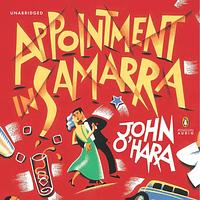You need to sign in or sign up before continuing.
Take a photo of a barcode or cover
This is ok. I found this book in a pile of used books and scooped it up because it had a Hemingway endorsement on the dust jacket. Reminded me of Updike in some (good) ways. Possibly deserves a reread.
Bleak and bleary, the ending's a small sucker punch. Overall, this story is a portrait that reminds us that, from the outside, all of our lives, no matter how seemingly insignificant and petty, affect everyone we meet...for better or worse.
About halfway through this book, I was starting to get tired of it. It's a story of an asshole and his descent from a presumably high status, all self-inflicted. Beginning with a humorous touch, it started to wade into the territory that reminds me of the dudebros who don't realize Walter White is the bad guy in Breaking Bad. Julian English was starting to increasingly like a morbid train wreck without any of the context or self-reflection that would have made it interesting.
But then the ending I do wish that there was more exploration and context of many of the characters rather than the borderline voyeuristic exploration of Julian's increasingly self-destructive behavior.
Overall, an interesting book with a good ending and a bitchin' title, but felt like it could have used a little more meat.
But then the ending
Spoiler
of Julian's suicide really felt like a gut punch, and the exploration of each character's response was impactful.Overall, an interesting book with a good ending and a bitchin' title, but felt like it could have used a little more meat.
This debut novel from the classic-but-lesser-known O’Hara is — unsurprisingly — compared to Fitzgerald, Updike, Steinbeck, Hemingway, etc. In fact, you can’t go more than a couple of reviews without seeing these names pop up. If I were to throw a name out there I’d throw Paul Simon’s, as I can’t read “John O’Hara” without a certain desultory philippic playing in my head, but I digress. I can see how this three-day story — over Christmas! — of a man’s decline during the Prohibition and Great Depression years would largely fall by the cultural wayside over time. It’s certainly dated in a lot of regards; not just in the prejudices displayed (like the frequent antisemitism), but much of the language and references. However, this serves as a bit of a time capsule for younger readers, especially as it paints a far less rosy view than many of his contemporaries did. It’s also notable for its depiction of female sexual pleasure, something fairly rare for the mid-1930s.
I’d recommend this to fans of the previously-listed authors as well as “failure of the American Dream”-esque tales.
I’d recommend this to fans of the previously-listed authors as well as “failure of the American Dream”-esque tales.
I liked this better than BUtterfield 8, you can see where John Updike got some of his inspiration.
Excellent novel about a young, wealthy, depression era couple who falls apart. Written by the most prolific short story writer in the history of the New Yorker Magazine. A book to stay up late for...
My mom recommended this to me but I just struggled to get into it at times. There were chapters and parts that were interesting and kept me on my toes, but at times I was also bored. The best part of the book for me was a peak into how people thought and the culture of a small town in the 1930s.

